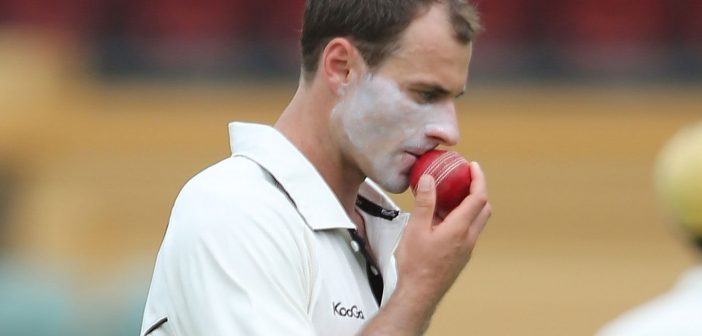Sports Desk: The coronavirus pandemic may force cricket’s world governing body to tweak one of its oldest rules and approve the use of an artificial substance to help shine the ball, effectively legalizing what has for long been a core tenet of the sport’s anti-tampering stance.
The revolutionary move is being mulled after the International Cricket Council’s (ICC) medical committee highlighted the dangers of players continuing the ‘usual’ methods of using spit and sweat on the red cherry following the Covid-19 outbreak.
The use of saliva to help one side of the ball retain its shine is more prevalent in Test cricket, played with the red ball, and is intended to assist faster bowlers who are looking to swing the ball through the air.
“Authorities are considering the use of artificial substances to help polish the red ball under the supervision of umpires in long-form matches, in order to end the need for players to do so with saliva,” said a report in ESPNcricinfo.
The three Test series between the West Indies and England in June has been postponed due the novel coronavirus outbreak, Cricket West Indies (CWI) said on Friday. The West Indies had been scheduled to play June 4-8 at The Oval, June 12-16 at Edgbaston, June 25-29 at Lord’s.
World Triathlon Grand Final will not take place in 2020, say organisers
The World Triathlon Grand Final set for this August in Edmonton, Canada will not take place in 2020, organisers said on Friday, with restrictions due to the COVID-19 outbreak making the event impossible to carry out. World Triathlon said it would look for “new options” to hold the event in the future.
Tennis players have considered stopping the practice of throwing sweaty towels at ball boys and fans, and many other sports are considering the use of abandoning pre-match handshakes and celebratory high-fives. But getting a ball to swing is probably the most intrinsic aspect of cricket, and the sport may be fundamentally altered without it.
Imparting moisture on one side of the ball helps to maintain a shiny side so that air passes quicker over it than the corresponding roughed-up side, hence creating movement in the air.
“As a consequence, (decision-makers) are open to the option of allowing for the use of an agreed artificial substance to polish the ball, in the fashion (umpires) currently allow the ball to be cleaned by players under supervision,” the report said.
Healthcare professionals have warned that saliva carries a significant risk of transmitting Covid-19, so fielders repeatedly applying spit on the ball before passing it on the bowler makes for a nightmare scenario. Even spinners blow into their hands and then lick their fingers to help get a better grip on the seam, all of which now seems horribly unhygienic.
The move comes two years after Australian captain Steve Smith and two other teammates, including opener David Warner, were banned and discredited for attempting to use sandpaper to rough up the ball in a Test match.
Tampering punishments were made more stringent after the incident. However, using external substances like vaseline, resin and bottle caps have for long been an underhand staple.
The matter will be taken up for discussion by the ICC cricket committee and the MCC’s world cricket committee in early July.



